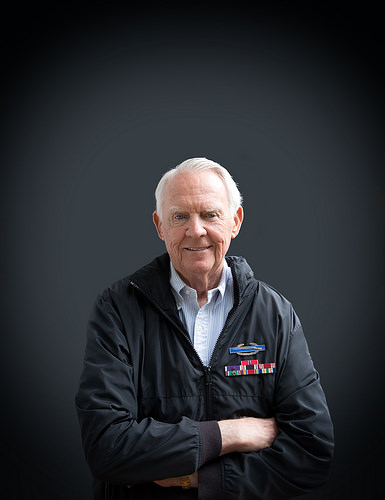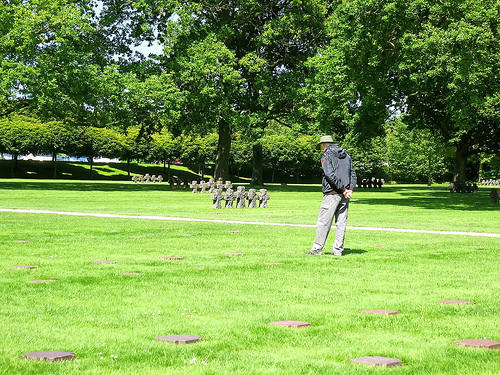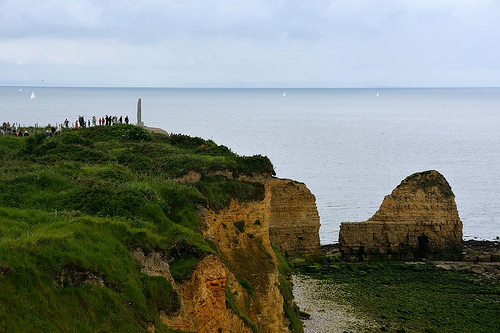Writer / Ray Compton
 Regarding his first trip to southern France as a 19-year-old from Indiana, Carver McGriff remembered the sandy beaches, the ocean waters and the abundance of hedgerows sprouting from the French soil. And he still vividly recalls the chilling sight of a dead American soldier lying on Omaha Beach.
Regarding his first trip to southern France as a 19-year-old from Indiana, Carver McGriff remembered the sandy beaches, the ocean waters and the abundance of hedgerows sprouting from the French soil. And he still vividly recalls the chilling sight of a dead American soldier lying on Omaha Beach.
“That’s when I knew the war was real,” McGriff remembered 70 years later from his home in Zionsville. “There was no turning back.”
Certainly McGriff was not alone in that frightening deduction as he participated firsthand in the world’s largest amphibious military invasion: D-Day in June 1944 at Normandy. Overall, over 850,000 Allied troops landed on the French beachhead in the summer of 1944 to launch the ground assault against Nazi Germany during World War II in Europe. History shows that 11 months later, German zealot Adolph Hitler had committed suicide and the Nazis would surrender after their empire was battered from border to border by the Allied coalition.
The Greatest Generation had closed the book on one war.
Nowadays, McGriff annually returns to France in a much different setting. Since 2010, he and wife Marianne have accompanied a travel group of 40-50 as part of the St. Luke’s United Methodist Church Normandy trip. Organizer Bob Zehr is already planning a fifth trip for August 2015. And he already has the 89-year-old McGriff ticketed for the voyage.
“While seeing Normandy alone can be inspirational,” said Zehr, owner of the Oak Hill Mansion in Carmel, “many people have said that traveling with Carver has made it a trip of a lifetime. Carver is able to relate both the history of the war and his personal history in such a way that people feel they are actually experiencing much of what happened 70 years ago. Carver creates an opportunity for them to feel a very personal connection.”
McGriff, pastor at St. Luke’s for 26 years, has scripted his war story into the book Making Sense of Normandy: A Young Man’s Journey of Faith and War. His personal history included being wounded in his arms and legs during his first month of combat in France, and soon afterward becoming a German prisoner of war for approximately a month.
“There are no words to adequately describe the terror of war when you are under machine-gun or artillery fire,” McGriff told the authors of The Memories of Those Who Were There. “You visualize each incoming round, thinking it might hit you…(you) experience the ultimate feelings of fear, isolation and helplessness.”
But the American teenager also learned another lesson during his time as a POW. “The German kids were just like us,” he assessed. “They had friends and families waiting for them back home.”
The compassion demonstrated by the enemy soldiers resonates seven decades later for McGriff. “They (the Germans) were good to me,” he said. “I was one of very few Americans held but I was able to bond in a way with the Germans.”
The Germans also provided the needed medical care. Now, in some ways, McGriff repays his capturers when he returns to Normandy and visits the nearby cemeteries. He asks his tour partners to pray for both the fallen American and German soldiers at the massive cemeteries (approximately 10,000 graves in the U.S. cemetery and a staggering 30,000 in the German counterpart).
 “I ask each of them to go into the American cemetery, pick out a cross and then say a prayer for that soldier,” McGriff related. “I tell everyone that it has been a long time since someone has said a prayer for him. But then I also ask them to do the same thing for a German boy. God loves them as much as he does us.”
“I ask each of them to go into the American cemetery, pick out a cross and then say a prayer for that soldier,” McGriff related. “I tell everyone that it has been a long time since someone has said a prayer for him. But then I also ask them to do the same thing for a German boy. God loves them as much as he does us.”
That sharing of emotions has not been lost on his 200 travelmates in the last four years. “Carver is a very patriotic person but he doesn’t take sides on the trip,” said Chuck Sawyer, a retired Eli Lilly executive whose father served in France. “He doesn’t attack the Germans in any way. It’s like God has given him a mission in dealing with the War.”
Zehr noted that McGriff has uncovered a way “for the travelers to share in the deep appreciation and admiration for what that generation was able to accomplish against great odds.”
But McGriff slightly alters each episode with his focus and comments. For instance, he shared with others in June that he wanted to find the restaurant in which he was held prisoner by the Germans. He asked for assistance in receiving divine intervention on the message. Eventually he, Marianne and another couple received help from the natives and discovered the site.
“He adds to the experience each time he goes,” said Sawyer. “It is not a canned delivery. He always has that twinkle in his eye when he talks.” Sawyer continued by noting, “Carver is an extremely humble man, although to me his is an icon.”
In the most recent return to Normandy, McGriff and mates were part of the worldwide 70th anniversary celebration of D-Day. Among the visitors were numerous world leaders, including Barack Obama, Vladimir Putin and Prince Charles, who were part of the festivities at Omaha Beach. The celebration also included honoring the heroes who landed at Utah and Sword Beaches.
It was another humbling moment for the onetime soldier who, upon his stateside return, received his college degree from Butler and a religious degree from the Garrett Theology Seminary. “I can’t say a lot about the spiritual meaning of fighting,” McGriff remarked. “But the war helped make me a certain kind of person. I understand what it means to be afraid and to have other emotions. The war and fighting taught me a lot of things about life.”
During each return to Normandy, he relives a rerun of that day in June 1944. Is it an emotional journal? “Not in an unpleasant way,” McGriff said. “It is kind of like seeing a movie that I have seen.”
But, recently, there was new footage added to the film. One of Marianne and Carver’s daughters, Sarah, a 1999 graduate of Zionsville High School, moved to Berlin. She married a German and now has two children. The old soldier has now seen the full circle of life and war. He has two German-American grandchildren.
A few questions and answers with Carver McGriff, an 89-year-old World War II veteran from Zionsville who in 2009 received the Chevalier, an honor bestowed on him by France for his service in the war.
How touched were you on receiving the French Legion of Honor medal?
“Only in the sense that I represent 400,000 young men who died in the war and never came home. I represent those who did not come home and served honorable lives.”
What did you think of the movie, Saving Private Ryan?
“From a public relations standpoint, it was a very exciting movie. In the movie it seemed that Omaha Beach was maybe 300 or 400 yards wide—but it was several miles wide (approximately 50 miles from one end to the other.)”
Why do you make the annual pilgrimage to Normandy?
 “For those boys who died there. They deserve to be remembered today.”
“For those boys who died there. They deserve to be remembered today.”
What amazes you most about the American soldiers in World War II?
“The average age was only 20 ½.”
What is it like to go to the cemeteries—American and German—near Normandy where 40,000 soldiers are buried from the two sides?
“It is like walking into a church. You whisper. There is kind of a code to be very quiet.”
What feelings do you have for the soldiers who returned from Vietnam and did not always receive favorable responses from their home-country citizens?
“The Vietnam veterans got a bad rap. The ones who went should have been treated better.”
After you were rescued as a prisoner of war, what did you do during the remaining days of World War II?
“Because of my injuries, I was classified to limited service only. I went to London and worked in a post office until December 1945.”
What did you do after you graduated from Butler?
“I had a business, but I was totally lost. That was when I felt I had the call to go into ministry.”
What message did you deliver during last month’s Flag Day celebration in Zionsville?
“I told the young people that I wanted them to become the greatest generation.”
You are approaching your 90th birthday. How many more years will you continue taking the tour to Normandy?
“Each year I say it is going to be my last one. But then more people want to go.”






Comments 1
4.5